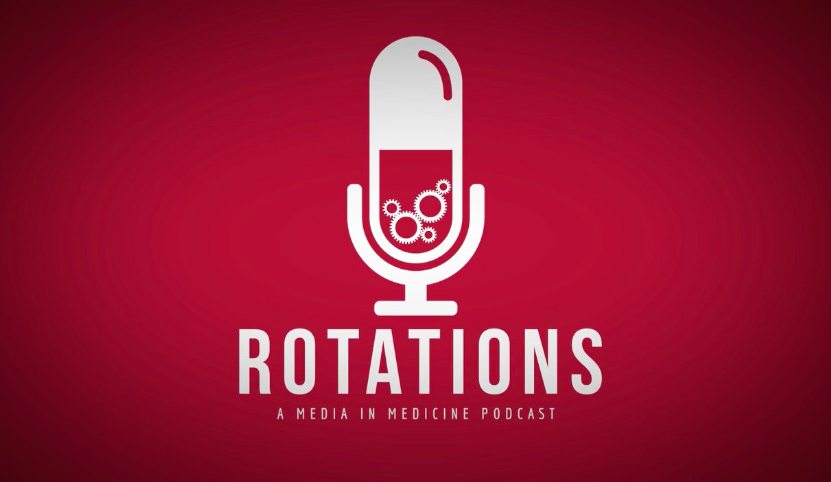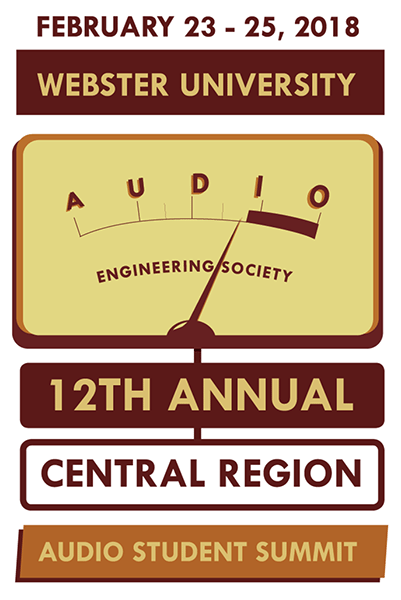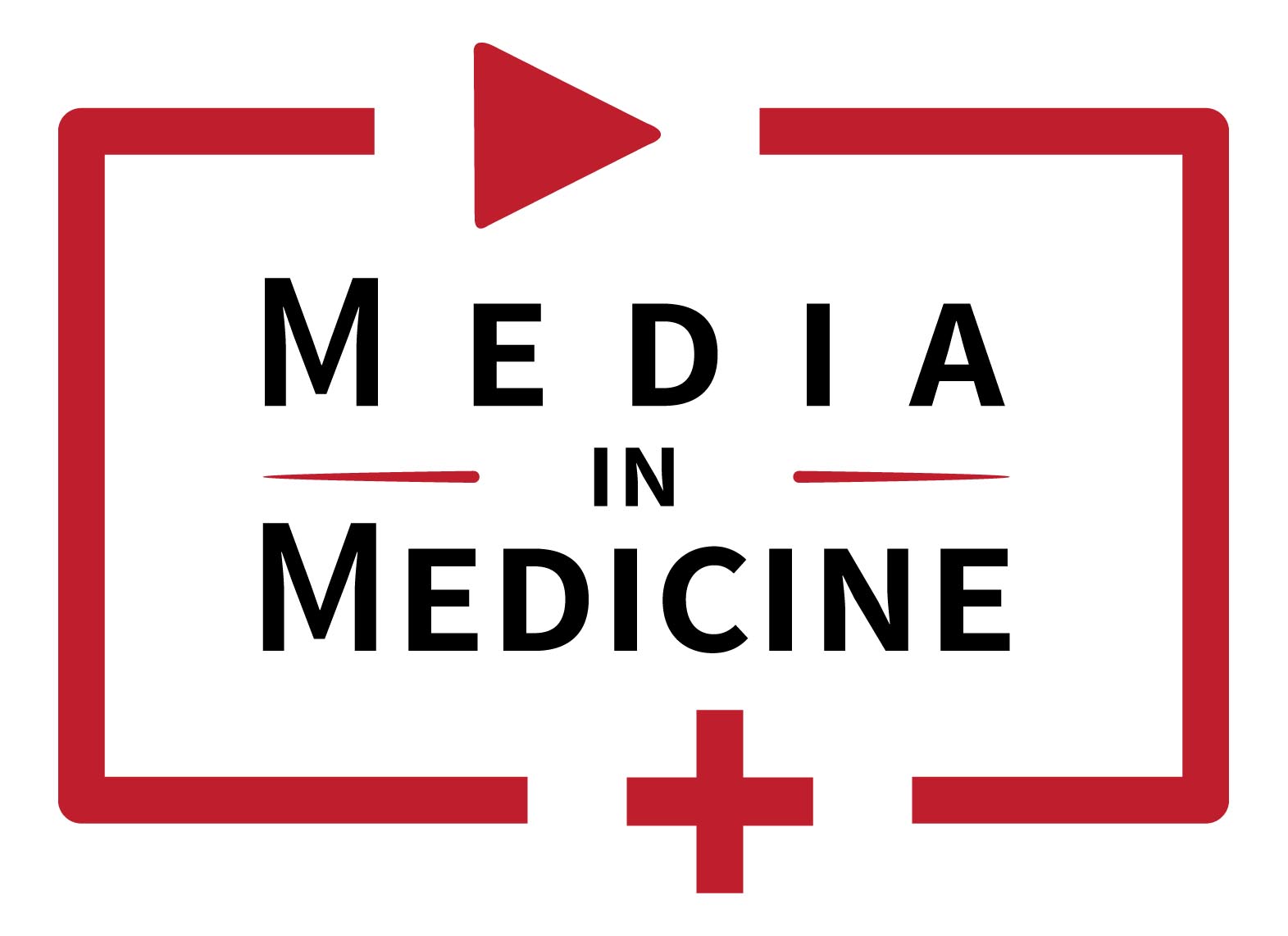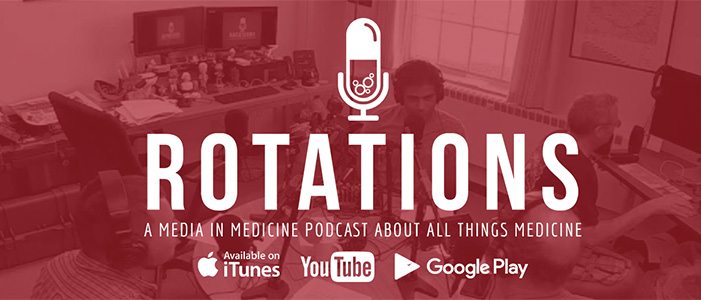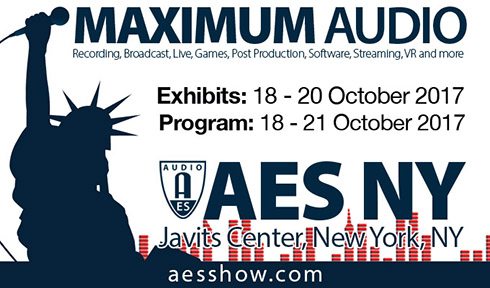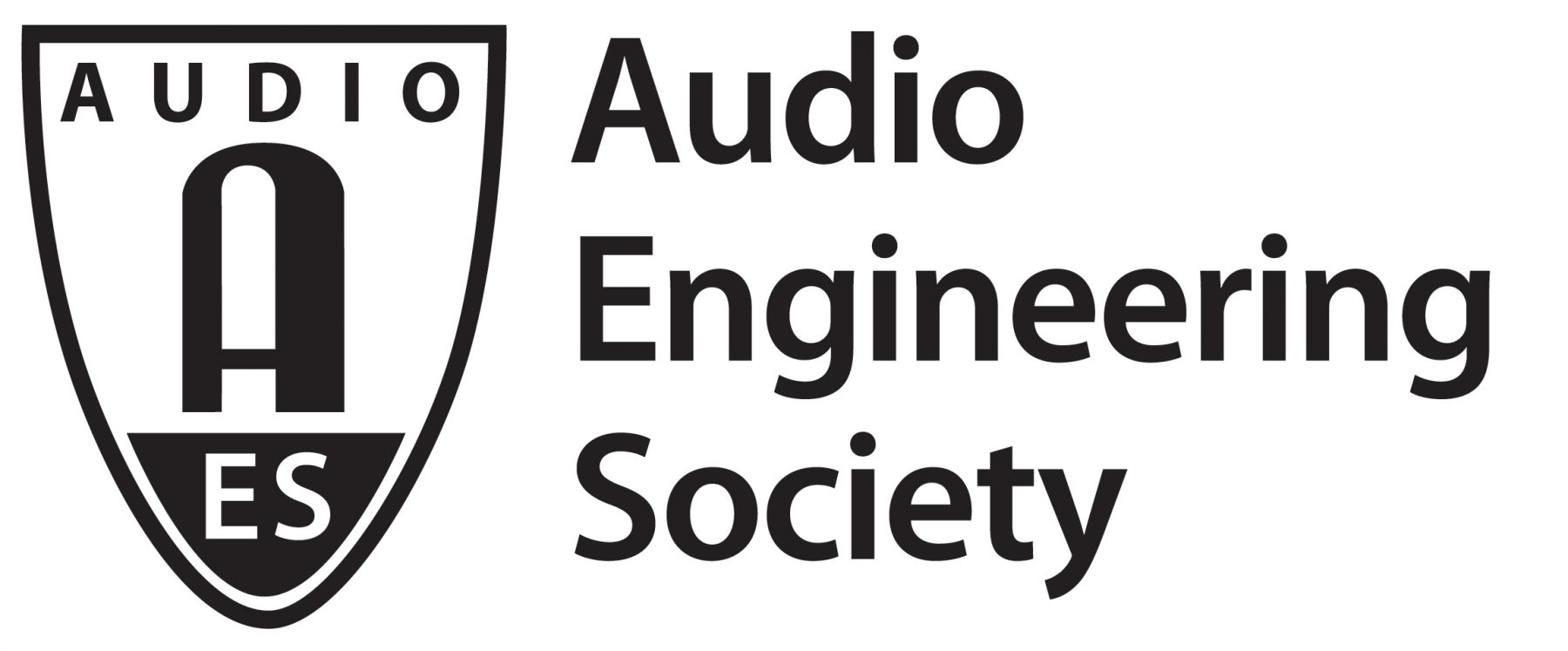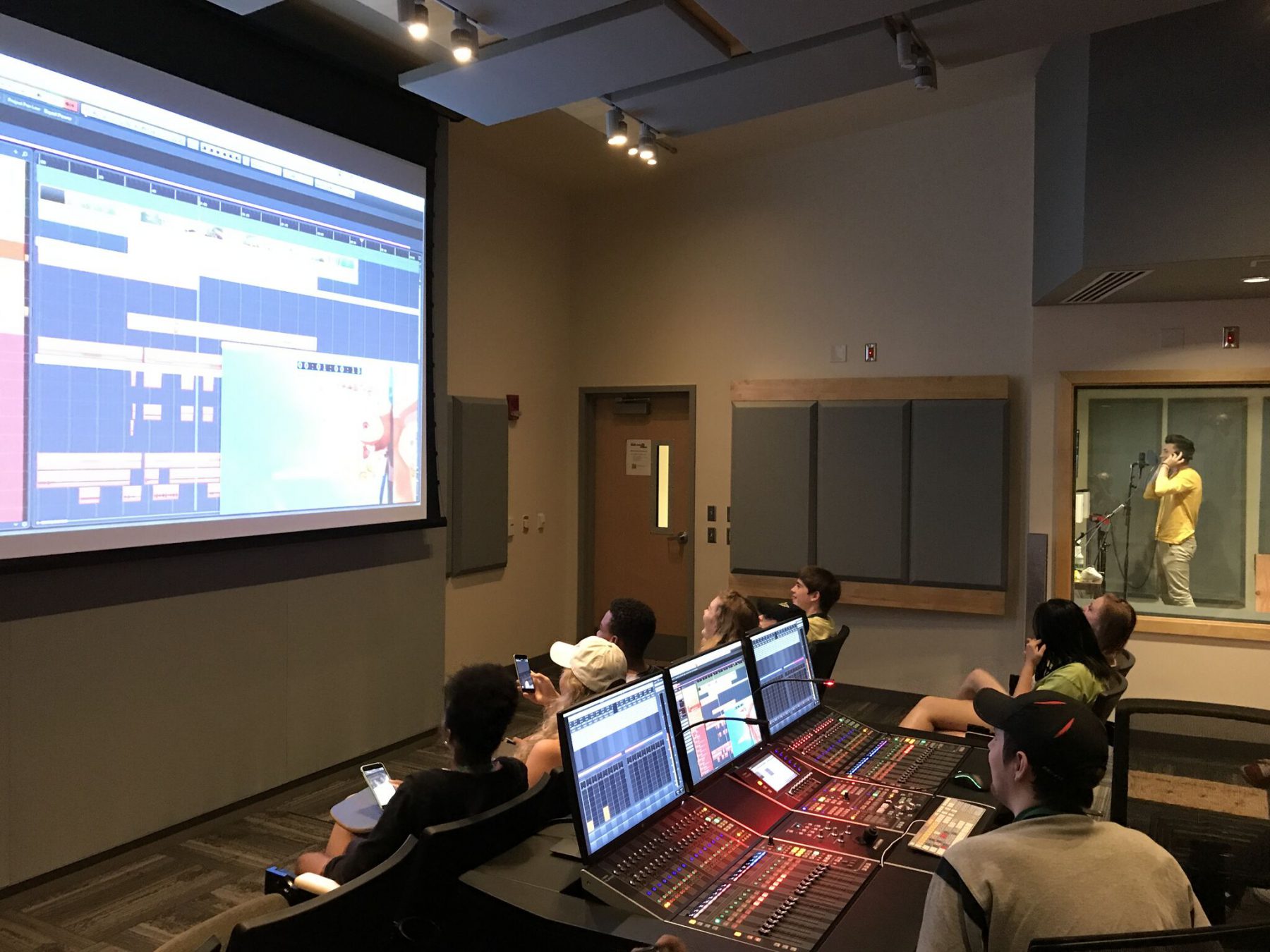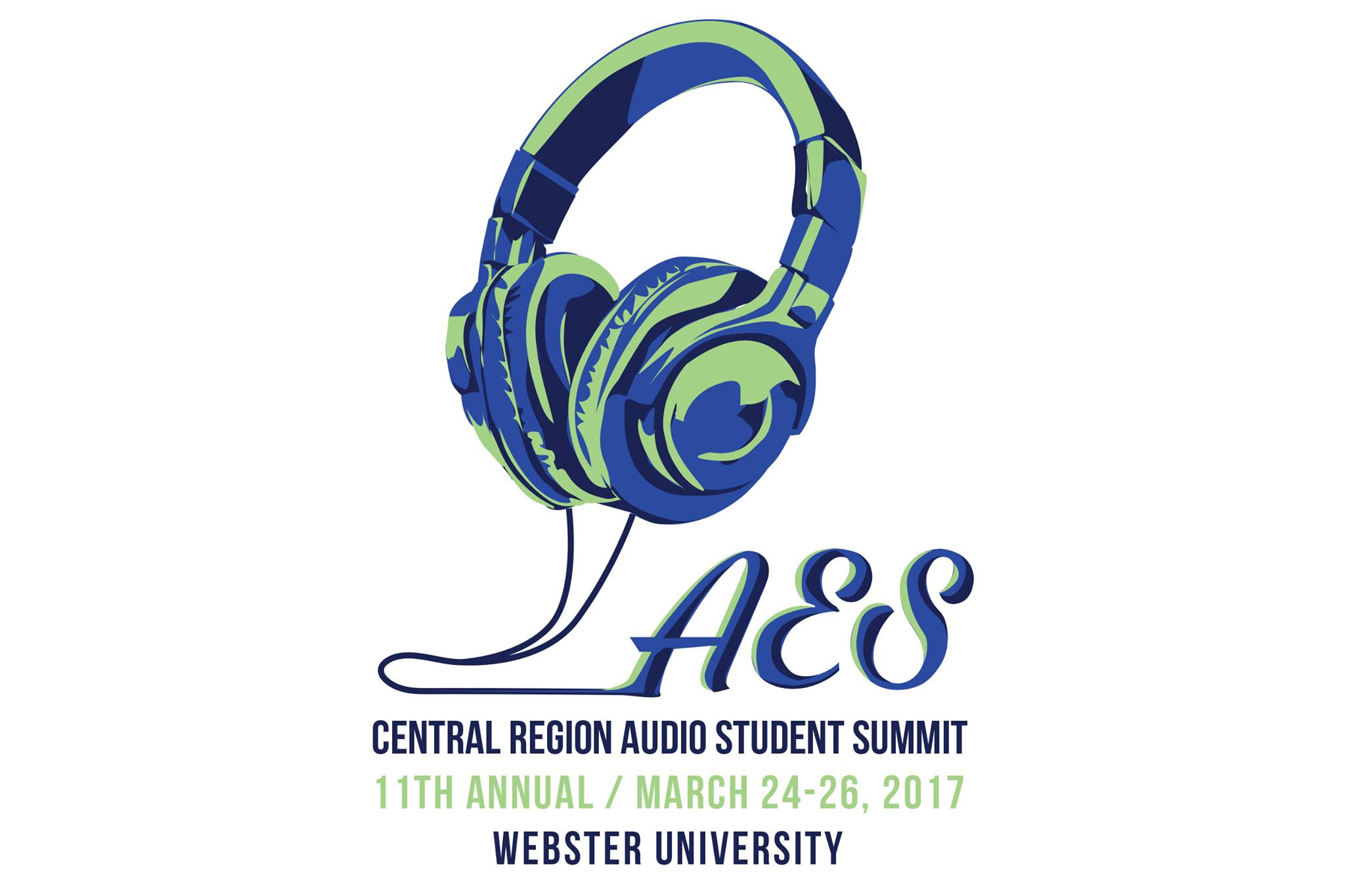Kyle P. Snyder, Lecturer in the School of Media Arts & Studies and Audio Post Production Coordinator & Engineer for The Veterans’ Project, has also been serving as Supervising Audio Engineer to Rotations, the weekly podcast of all things medical. Rotations is a production of Media in Medicine, a family of medical storytelling initiatives developed by faculty from Ohio University’s Heritage College of Osteopathic Medicine and the Scripps College of Communication which includes The Veterans’ Project. The podcast has also been presented by its creator, Nisarg Bakshi, to great acclaim at the North American Primary Care Research Group in Montreal in Fall 2017 and at the Ohio Osteopathic Symposium in Spring 2018. Download or view Rotations today on the show page using your podcast / vodcast service of choice.
blog & news
Snyder To Chair Panels At 12th Annual Central Region Audio Student Summit
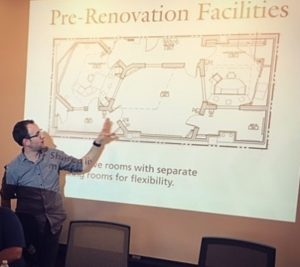 At the 12th annual Central Region Audio Student Summit hosted by Webster University, Ohio University Lecturer Kyle P. Snyder chaired two exciting panels and sat on two others. Get more information via the official Facebook Event or view the schedule online.
At the 12th annual Central Region Audio Student Summit hosted by Webster University, Ohio University Lecturer Kyle P. Snyder chaired two exciting panels and sat on two others. Get more information via the official Facebook Event or view the schedule online.
- Studio Maintenance – How to upkeep and maintain your home or professional studio
- Audio Facility Design & Troubleshooting (chair) – Insight into how to design your facility and keep it operational
- What the AES Did For My Career – How involvement in professional organizations can open new doors for your career
- Audio For Film (chair) – Exploring techniques used in audio for film
This event welcomed over 300 people consisting of audio students, high school students, audio professors and anyone interested in the subject of sound. Panelists consist of a wide variety of professionals in the audio field, including engineer for Wiz Khalifa and The Roots Paul Womack and the Keynote Speaker this year, Bob McCarthy, Director of System Optimization at Meyer Sound. There are numerous panels ranging from recording and mixing, audio for film, live sound and much more! This event is an excellent way to expand your knowledge on audio and network with professionals.
Snyder Leads Audio Team On The Veterans’ Project
Many American physicians know that they need to do a better job of helping the veteran population. When Todd Fredricks, a physician with Ohio University’s Heritage College of Osteopathic Medicine, and Brian Plow, an associate professor and associate director for undergraduate studies in the Scripps College of Communication, joined forces to create a tool student physicians could use to better understand their future veteran patients ─ they knew they had found their answer ─ a documentary film called “The Veterans’ Project.”
Due out in May 2017, the documentary is produced by “Media in Medicine,” a collaboration of visual media and medicine between Fredricks and Plow to create and teach through stories.
Kyle P. Snyder, Lecturer & Outreach Coordinator in the School of Media Arts & Studies, is serving as Audio Post Production Coordinator & Engineer for “The Veterans’ Project” and leading a team of students in the completion of the final deliverables.
The inspiration for the documentary came from research produced by Dr. Fredricks, who found that civilian doctors often don’t fully understand the physical and emotional trauma of combat or know what common issues to watch for in these patients.
“If we teach people to ask the right questions, maybe we will get better care as an outcome,” said Dr. Fredricks.
Dr. Fredericks presented his findings at professional conferences and published them in a medical journal. However, he knew that he could only reach a certain audience of colleagues using these methods. He wanted to spread the message more broadly and connect with medical students and physicians who needed to hear it most.
Both faculty members agreed early in the project that the veterans’ interviews would serve a dual purpose: as documentary sources and as subjects of a qualitative research project designed to document and analyze service personnel experiences with combat and health care. As a result, the documentary interviews are conducted in a systematic, consistent manner so the team can collect viable research data as well as compelling stories for the film.
Both the filmmakers and veterans spend time vetting each other before agreeing to participate.
“Once they see that we have a clear and unique intention, the reception is very good and they are very generous with their stories and time,” Plow said.“ The subjects tend to launch into an eloquent and moving recounting of their experiences.”
Though the interviews are standardized for the sake of research integrity, the filmmakers also seek opportunities to shoot additional footage of the veterans’ lives in order to paint a more complete and honest picture of them for the documentary. The subjects have been fairly amenable and have allowed the filmmakers to capture family dinners or birthday parties.
As for the veterans’ interactions with the health care system, Dr. Fredricks said that the most common theme that they see are false assumptions on the part of clinicians.
For example, a veteran recounted how his local physician assumed that he was seeking heavy painkillers for a fractured spine problem, when the patient wanted only to refill an ibuprofen prescription.
Dr. Fredricks has found—in the interviews and research—that clinicians also don’t understand Veterans Affairs services, including how veterans can easily access them.
“You can do legitimate research in a beautiful way,” Fredricks said. “The elegance of the format can help build knowledge.”
More information about the project can be found online at http://www.mediainmedicine.com/.
Snyder Leads Engineering Team for Rotations Podcast Which Combines Medicine & Media
What do an aortic valve and sound editing software have in common? On the surface, not much. But if you’ve listened to Rotations, a collaborative podcast between the Scripps College of Communication and the Heritage College of Osteopathic Medicine (HCOM), the connection might seem clearer.
Rotations is part of the larger Media in Medicine project, which aims to teach and create through medical storytelling. The podcast was the brainchild of second-year medical student Nisarg Bakshi and Todd Fredericks, assistant professor of family medicine in HCOM. It focuses on medical students, particularly those entering their second year, and some of the challenges they face.
Kyle P. Snyder, lecturer in the School of Media Arts & Studies who serves as the audio engineer, explained that it’s important to create a sense of community for medical students to let them know other students are experiencing similar triumphs and challenges.
“Personally, I’m very interested in the human side of medicine — the stuff you can’t find in a textbook. I think most medical students love learning about these things too, but we don’t always have the time to hunt down the information ourselves,” Bakshi said.
Brian Plow, associate professor in the School of Media Art & Studies, serves as the director of editing. “It’s really fascinating to see the role media plays in interdisciplinary study,” Plow said. “We really are building a bridge between media and medicine and becoming storytellers together.”
“I also think that podcasts are a great way to disseminate information. They’re quick; easy to put on while driving, running or doing other tasks; and I thought it would be cool to have a medically-oriented podcast that was both interesting and accessible for anyone interested in medicine,” Bakshi explained.
Plow stressed that although Rotations has a target audience of medical students, the information it provides can be relevant to anyone. A recent podcast that featured College of Fine Arts professor Lori Esposito in a talk about how creating art can be used to avoid burnout — advice that everyone needs from time to time.
Currently, the podcast has pre-recorded enough material to make about 40 half-hour episodes. They plan to measure and compare data from both iTunes and YouTube to help shape the show for future seasons. Rotations will also partner with assistant professor Laeeq Khan and the Social Media Analytics Research Team (SMART) Lab to analyze its social media presence.
The work done by the Media in Medicine team has already made an impact, even on those like Snyder who are involved in production. “I really like what Media in Medicine is doing, which is taking issues within medicine and using media to go out and create good with it.”
For more information about the Media in Medicine project, visit their website at http://www.mediainmedicine.com/.
Snyder Chairs Student & Career Track At 143rd Audio Engineering Society Convention
At the 143rd Audio Engineering Society Convention hosted in New York, New York from October 18 – 21, Ohio University Lecturer & AES Governor Kyle P. Snyder chaired the Student & Career Track. “Our AES student members and younger attendees are literally the future of the audio industry,” said Kyle P. Snyder. “Our Student and Career Development events are designed to educate and encourage the next generation of audio industry pros, something that’s always been a top priority for AES.” The four day program featured a packed schedule including mentoring events, recording critiques, student recording & design competitions, and various special events.
The 143rd Convention also saw the historic naming of the student design competition after industry legend Saul Walker. The naming was formally announced during the AES New York 2017 Opening Ceremony, on Wednesday, October 18, with members of the late Mr. Walker’s family in attendance.
The Saul Walker AES Student Design Competition is an opportunity for aspiring hardware and software engineers to participate in a worldwide contest during AES Conventions and gain recognition for their hard work, technical creativity, and ingenuity, as well as advice and mentorship from the competition judges. Students are encouraged to submit entries, with few restrictions on the nature of the projects, except that designs must be for use with audio. The competition is one of many throughout AES Conventions that are coordinated by the Student Delegate Assembly. “Our student & career events are a cornerstone of the convention and fantastic opportunities for students to grow in their craft,” said Kyle P. Snyder, AES Education Committee Chair. “We’re honored to pay tribute to Saul Walker in the most fitting way possible, by connecting him to future hardware engineers through our educational initiatives.”
Snyder Elected To AES Board Of Governors
The AES has released the list of winning candidates from the 2017 Audio Engineering Society international elections. The newly elected officers will assume their roles in October, shortly after the end of the 143rd International AES Convention in New York. Joining President-Elect Wallaszkovits on the AES Board of Governors will be eight newly elected Governors and officers, all beginning two-year terms in October. Kyle P. Snyder, also Chair of Education & Membership, is among the newly elected Governors-at-Large, alongside Jonathan Wyner, and Martha de Francisco.
“In this exciting period of growth and innovation for the Audio Engineering Society, the membership has voted in a dynamic group of new officers,” said AES President Alex Case. ‘I personally look forward to working with, and learning from, these talented individuals as they apply their diverse knowledge and experience to the task of leading the Society into the future.”
“This is an exciting time for AES,” said Snyder, “and I couldn’t be more honored by my peers to be trusted in the leadership of this wonderful organization.”
Within the stipulations of the AES bylaws, the overall function and direction of the AES is established by the Society’s Board of Governors, which is elected by voting members of the Society. The Society’s Executive Director operates and manages the AES headquarters in New York City and reports to the Executive Committee, which consists of the Society’s corporate officers. In turn, the Executive Committee reports on its activities and on issues facing the Society to the full Board of Governors. The AES President serves as the CEO of the Society, under the supervision and direction of the Board of Governors.
For more information on the AES and how to become involved, visit aes.org.
Snyder Hosts Students For 2017 High School Media Workshop
The School of Media Arts & Studies’ fourth annual High School Media Workshop, which took place June 20-24, introduced students to the media arts industry with specialized classes taught by Ohio University professors. Students learned some of the latest techniques in audio, music, video, animation, social media and other academic areas.
“We’re always changing up the workshop activities, and students are always engaged,” said workshop Director Karen Riggs. “Our biggest change is adding an extra day to the workshop this year. The students have more opportunities for unstructured time, when they can get to know friends, relax, do outdoor activities and spend more time completing their projects.”
During the workshop, students were divided into four groups that rotated through five different core sessions which provided a sampling of the MDIA curriculum. Throughout the week, students attended sessions on music production, video production, film sound, animation and games, and social media. Students were able to write and produce their own songs, learn basic animation, create sound for a movie, and produce a short video.
Jacob Lamp, a senior from Columbus, came to the workshop wanting to focus on music production. He already has an internship at a music studio where he can sit in on production, but he “wanted to see what being in college and learning about it is really like.”
Lamp also enjoyed some of the other workshop sessions.
“Animation was cool to play around with,” said Lamp. “I’ve never experienced anything even close to that. I like how the workshop gives you a little bit of everything.”
For Imani Menefee, a senior from Dayon, this was her first time attending the media workshop.
“I really love sound. I didn’t realize how much went into sound for animation, or in general, what you have to do to get a certain sound. It’s really cool though,” said Menefee on her experience working to create sound effects for an animation in the new Schoonover Sound Post-Production & Listening Lab. She aspires to someday work in film production.
One of the workshop student leaders, Wesley Shynn, an OHIO junior studying music production, attended the inaugural media workshop four years ago. He said that it was a good experience being on the other side of the workshop this time and that “it’s cool to see how the workshop has improved over the past four years.”
This year’s workshop had 60 students who came from several states, including Georgia, Illinois, Maryland, Michigan, North Carolina, Ohio, Pennsylvania, and Wisconsin.
“An incredible aspect of the High School Media Workshop is that students attend not only to experience what the School of Media Arts & Studies has to offer within its curriculum but also for that first college experience, including one-on-one mentoring to help focus their passion and future career goals,” said workshop Associate Director Kyle P. Snyder. “It’s truly gratifying seeing students interacting with one another and engaging in the creative process; their imagination and unique and creative spirit helped facilitate a powerful educational experience.”
The workshop ended with a farewell banquet and screening of student projects created during the week.
Andie Walla, faculty member and video production instructor, said that “some of the projects we showed tonight are so well done that you wouldn’t think they’re high school student videos.”
For more information on the High School Media Workshop, visit http://mediaschool.ohio.edu/hsmw. To see coverage of the workshop on Twitter, search #OUHSMW.
View student projects from this year’s workshop here.
Snyder Presents at 142nd Audio Engineering Society Convention
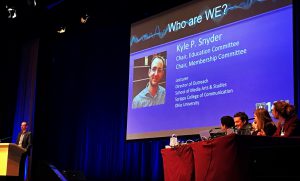 At the 142nd Audio Engineering Society Convention hosted in Berlin, Germany from May 20 – 23, Ohio University Lecturer & Director of Outreach Kyle P. Snyder chaired a panel, Audio Education—What Does the Future Hold.
At the 142nd Audio Engineering Society Convention hosted in Berlin, Germany from May 20 – 23, Ohio University Lecturer & Director of Outreach Kyle P. Snyder chaired a panel, Audio Education—What Does the Future Hold.
According to Snyder:
In this roundtable discussion featuring invited experts from across the continent, we discussed the trajectory of audio education including challenges unique to both educators and students, suggestions for the future, and how employers expect audio education to adapt to their ever-changing needs.
Workshop Links:
 The 142nd AES Convention brought together the world’s largest gathering of audio professionals, offering attendees opportunities to hear from top audio industry figures while also sharing the latest research and technology information through informative papers, tutorials, workshops and special events.
The 142nd AES Convention brought together the world’s largest gathering of audio professionals, offering attendees opportunities to hear from top audio industry figures while also sharing the latest research and technology information through informative papers, tutorials, workshops and special events.
Snyder To Chair Panels At 11th Annual Central Region Audio Student Summit
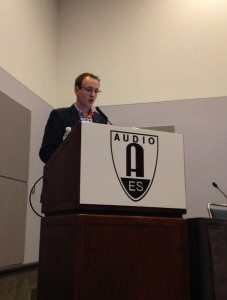 At the 11th annual Central Region Audio Student Summit hosted by Webster University, Ohio University Lecturer Kyle P. Snyder will chair two exciting panels:
At the 11th annual Central Region Audio Student Summit hosted by Webster University, Ohio University Lecturer Kyle P. Snyder will chair two exciting panels:
- Audio For Film – Exploring techniques used in audio for film (view schedule)
- What the AES Did For My Career – How involvement in professional organizations can open new doors for your career (view schedule)
This event welcomes over 300 people consisting of audio students, high school students, audio professors from around the area, and anyone interested in audio. Panelists consist of a wide variety of professionals in the audio field, including 14-time Grammy Award winner Richard King, engineer for Wiz Kalifa and The Roots Paul Womack, and our Keynote Speaker this year, AES President Alex Case. The event features many different panels ranging from recording and mixing, audio for film, live sound, and much more.
